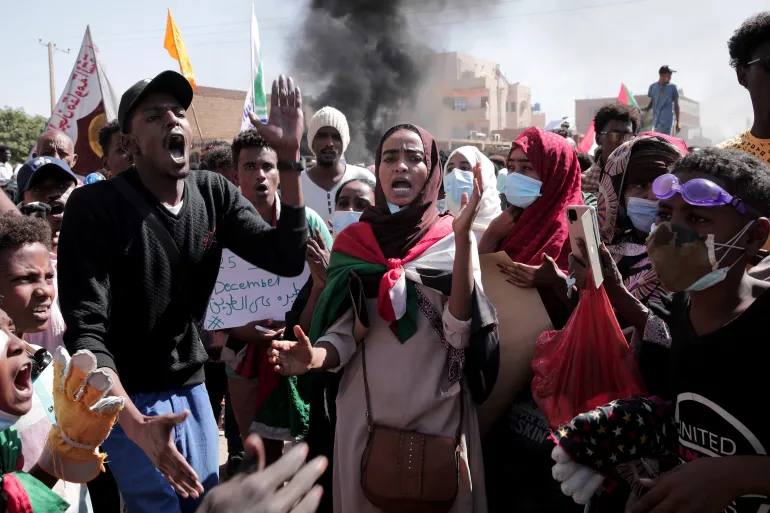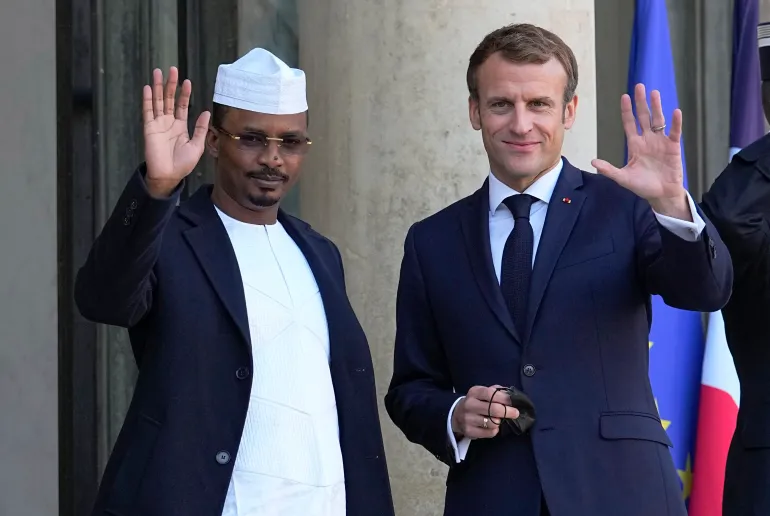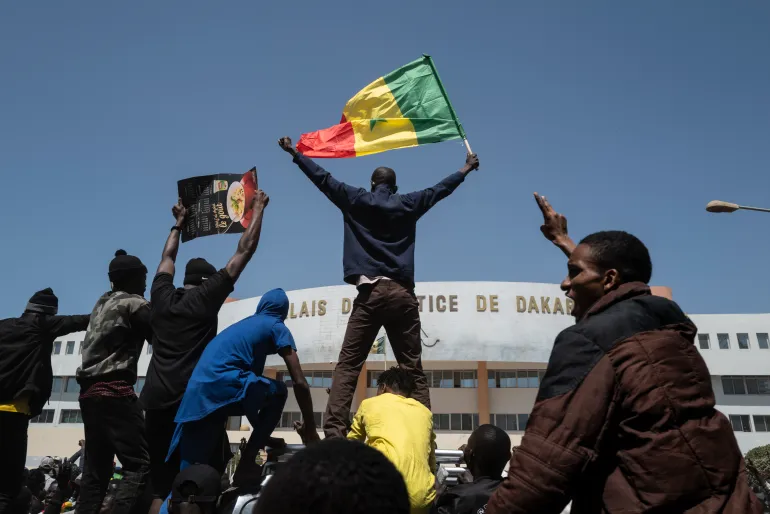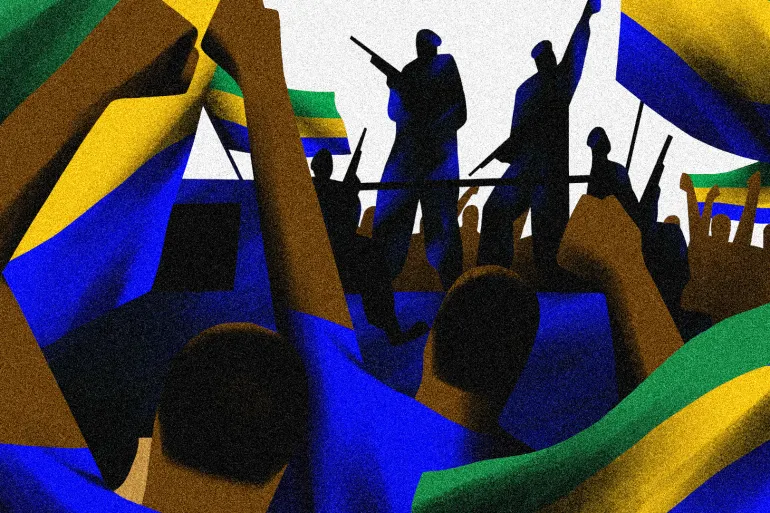More and more people in Africa are starting to agree with military takeovers. Analysts say that civilian governments are to blame for this trend.
In August, some soldiers in Gabon removed President Ali Bongo from power. His family had been in charge of the country for almost sixty years. Lots of regular people took to the streets to cheer this change.
When Bongo asked the world to speak out against the coup, it became a joke on the internet. People made funny videos and posts, making fun of his wish to hold onto his position.
In the last few years, there have been many coups in parts of Africa. Mali started it three years ago when their army took over, led by Colonel Assimi Goita. Then Guinea, Sudan, Chad, and Burkina Faso all had military takeovers. Niger also experienced a coup in 2023, and then came the one in Gabon. During this time, The Gambia, Guinea-Bissau, and Sao Tome and Principe also had attempts at coups, but they didn’t succeed.

In a lot of these cases, regular people seemed to support the uprisings and takeovers. This makes us wonder if people are getting tired of civilian-led governments, even if they’re supposed to be democratic. Could Africa be heading for more coups? And how much do outside influences, like France or Russia, or regional groups like ECOWAS, play a role in all of this?
In simple terms, experts say that in parts of Africa like Francophone West Africa and the Sahel, the way democracy works isn’t strong enough. This leads to more problems like unfairness, dishonest leaders, and shaky agreements between different groups. Because of these issues, big, powerful countries want to step in and have more control. All of these difficulties together make this area more likely to experience coups.
Where’s the democratic dividend?
It’s not just pictures and videos of people cheering for coups. Actual facts show that in many places in Africa, the way democracy works in reality is quite different from what people were hoping for.
Most people in 34 African countries, according to a survey by Afrobarometer in September 2022, believe that fair and open elections are crucial for their interests. However, only 44 percent think that elections actually help remove leaders who aren’t doing what the people want. In 19 countries that have been regularly surveyed since 2008–09, more people are becoming skeptical about elections bringing about real change.

In general, fewer people in 26 out of 30 African countries support elections when compared to the period between 2011 and 2021. This includes countries like Sudan, Mali, Burkina Faso, and Niger, which have experienced coups in the past three years. Even in a country like South Africa, where elections have been mostly fair and free since apartheid ended, support for elections has dropped by 20 percentage points in the last ten years.
A political expert, Jonathan Asante-Otchere, points out that in many countries, citizens aren’t seeing the positive outcomes of democracy. This, he believes, is a big reason why people tend to support coup-makers. However, he also mentions that it’s uncertain if this support for coups will continue.
Issues like corruption, human rights violations, favoring one ethnic group, and involving the military in civilian politics have been problems for democracy in Africa for a long time. In Senegal and Ghana this year, soldiers have taken harsh actions in response to public protests. Trust in political leaders is decreasing across the continent. More and more, this is leading to either people becoming less interested or even actively supporting military rule.

In most of the 28 countries looked at by Afrobarometer between 2021 and 2022, a lot of people said they would be okay with a military government taking over.
Experts like Mutaru Mumuni Muqthar, who works at a center in Accra, Ghana, say that this is happening because the systems in place aren’t working well and democracy isn’t meeting the expectations of the local people.
Economist Daniel Amateye Anim points out that one of the main reasons for this dissatisfaction leading to support for military rule is tough economic conditions. In places like Mali and Guinea, the leaders who were overthrown were accused of being corrupt for a long time. The cost of living has been going up in many countries, and inflation was at a five-year high when Guinea’s President Conde was removed from power in 2021.
Anim, from a development organization in Accra, says, “I think it’s mostly because of the economic situations in the area, especially in those countries. The reasons are that it’s expensive to live, people can’t find jobs, and they see their political leaders living very comfortably.”
‘A change in hats’
Not all coups are the same.
In cases like Bongo in Gabon or Burkina Faso’s longtime president, Blaise Compaore, who was removed in 2014, the wishes of the people played a big role in making the military actions seem justified.
Some experts say that in certain situations, coups only bring about new leaders from the same powerful group that was already in charge of the country.
The coup in Sudan in 2021, for example, saw the country’s army, which had been part of a mix of military and civilian government since the 2019 revolution, take full control.
In Gabon, the main leader of the opposition has called Bongo’s removal a “palace coup”. Brice Nguema, the military leader who led the takeover, is actually Bongo’s cousin. He has let the ousted president move around freely. Dave Peterson, who works at the National Endowment for Democracy, agrees with this assessment. He said the coup in Gabon was basically just a change of leadership and not much more.
In some countries, the instability in the surrounding region has played a big part in making military takeovers possible, especially since 2011, when Muammar Gaddafi was violently removed from power in Libya.
Dave Peterson explains, “If we look back at the events, the fall of Gaddafi’s regime in Libya made things even more dangerous in Mali and the Sahel region.” The chaos and lack of control in Libya led to a flood of weapons and armed groups spreading through the Sahel, including in northern Mali.
Chad has also been heavily affected by the conflicts in Libya and Sudan. A Sudanese militia called the Janjaweed, which later turned into the armed group known as the Rapid Support Forces, backed by the Sudanese government, has been active along the country’s borders.
The fighting in Sudan has pushed hundreds of thousands of refugees to seek safety in eastern Chad. Idriss Deby, who led Chad for a long time, was killed in a battle in 2021 with rebels who had come from Libya. This event triggered the military takeover.
Whether it’s problems within the country or the consequences of wars in neighboring places, governments in the region have often responded with political violence. This has made tensions worse, taken innocent lives, and made it even harder to work towards lasting peace. Analysts say this shows a governing system that sees itself as a hammer and treats every problem like a nail.
Some governments see the state as a way to make people follow rules, but this idea has its limits. Often, governments can’t stop rebels from getting the weapons and supplies they need for big wars.
So, when this occurs, they often ask for help from powerful countries like France and, lately, Russia.
A failed ‘marriage’
In 2017, France, along with Germany and the European Union, created the Sahel Alliance. This group’s goal was to find better ways to coordinate aid and strengthen institutions in the G5 Sahel countries: Burkina Faso, Chad, Mali, Mauritania, and Niger. All of these nations were once colonies of France. The United States also supported the Sahel Alliance, shifting its focus from counterterrorism to improving infrastructure and institutions.
The Sahel Alliance was meant to mark a new phase of Western involvement in the region. French President Emmanuel Macron talked about “fraternity and mutual aid” rather than backing authoritarian leaders who use force to maintain power and suppress threats to their rule.
However, it’s hard for West Africa and the Sahel to forget France’s long history in their regions. Analysts point out that France has typically prioritized stability within its African partners, supporting leaders who rely on questionable elections and use the military to stay in control. France has also overlooked the exploitation of African people by their own governments, which have funneled billions of dollars in dollars in dollars in public funds through European and French institutions. It’s only in recent years, due to pressure from African anti-corruption activists, that France has started to investigate some of these corruption allegations, such as those against Denis Sassou Nguesso, the president of the Democratic Republic of the Congo (DRC), in 2015.
Muqthar, from the West Africa Centre for Counter-Extremism, believes that all signs point to the fact that the relationship between West African countries and France isn’t working well. There’s a strong feeling against France because of its exploitation, he says, and there’s a desire to seek different partners to meet their needs.
In recent coups in Niger and Guinea, there have been open displays of anti-French feelings that were shown to the world. Regular people protesting what they see as French control have been supported by military leaders who also see the coups as part of Africa gaining independence from colonial influences.
At the same time, several other countries like Turkey, the United Arab Emirates, China, India, and Russia have been expanding their economic and strategic presence in Africa. Some people have called this a new race to gain influence in Africa.
One group that often makes headlines is the quasi-Kremlin paramilitary group called Wagner. They’ve been hired by governments in places like the Central African Republic. They’ve also been linked to on-the-ground military actions in Mali and Niger. This has led French President Macron to accuse Russia of causing instability in Africa.
However, some experts wonder if the role of Wagner in the region is sometimes exaggerated by different parties to get Western attention and reaction. For example, in December 2020, Ghana’s President Nana Akufo-Addo said that Burkina Faso’s military government was employing Wagner personnel. This news worried Accra, leading them to seek help from the United States. However, the Ghanaian leader didn’t provide any evidence for his claim, and it ended up causing tension between Ghana and Burkina Faso’s leaders.
After the founder of Wagner, Yevgeny Prigozhin, died in a mysterious plane crash, it’s anticipated that the mercenary group will be more closely controlled by the Kremlin in the coming months. This might give us clues about Russia’s intentions in the region.
Although Russia has been criticized for supporting non-elected leaders in Africa, it’s important to note that the US and France have also supported Chad’s military government, led by Deby’s son, Mahamat. This raises questions about what lies ahead for the region.
‘Bonanza for extremist groups’
According to Simon Rynn from RUSI in London, there are many reasons why more coups could happen in the region. Numerous countries have faced issues like disputed elections, leaders trying to hold onto power for a third term, high insecurity, or economic stagnation. We can’t predict where coup attempts might happen next, but places like Cameroon, Togo, Senegal, and Benin are facing challenges in different ways.
However, while some countries might have similar conditions that have led to coups elsewhere, it doesn’t mean every nation is bound to experience one. For example, Togo has been seen as at risk of a coup for years, but its institutions have managed to withstand those threats. Even though Togo saw the first government overthrow in post-independence Africa, it hasn’t had a successful coup since 1967. This is credited to a strong and long-lasting relationship between the military and the ruling Gnassingbe dynasty.
Muqthar believes the current situation in the region is very serious. Armed groups are using the insecurity to spread their influence from the Sahel region to coastal West Africa.
Coups create opportunities for extremist groups to take advantage. While governments focus on stabilizing and reducing vulnerability, extremist groups use this time to increase their presence through attacks.
Groups like ECOWAS have been criticized for not effectively preventing coups and for struggling to support struggling governments in upholding democratic mandates. Rynn points out that in the past, the West African bloc has been slow to punish some members after coups, which has weakened its authority in opposing the ongoing wave of military takeovers. For example, ECOWAS didn’t take strong action when Ivorian President Alassane Ouattara took a controversial third term in 2020, which experts and the opposition argued violated the constitution limiting presidents to two terms.
After ECOWAS warned of potential military intervention in Niger following the coup against Bazoum, the military leaders in Niamey received support from their counterparts in Mali and Burkina Faso. This effectively created an alliance between the three nations.

People are becoming more and more unhappy with the governments they voted for. In July, Joseph Asunka, the CEO of Afrobarometer, shared that in a survey of 36 countries in 2021–22, only 38 percent of people felt that democracy was actually benefiting them.
Tanzanian President Samia Suluhu Hassan, who was present at the meeting, recognized the truth of this. She stated, “Unless African governments fix the problems in democratic governance and provide necessary public services to their citizens, democracy will always be a goal that is never truly achieved.
SOURCE :ALJAZEERA

